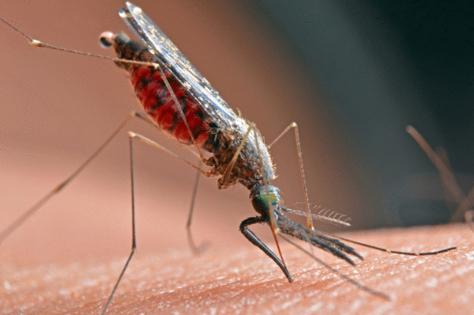Massachusetts reports first West Nile virus case in a human this year
Published in Health & Fitness
A woman in her 70s has been infected with West Nile virus in Middlesex County, the Massachusetts Department of Public Health reported Tuesday, marking the state’s first human case of the mosquito-borne disease this year.
“West Nile virus can be a very serious disease, and its presence in mosquitoes remains high right now in Massachusetts,” said Public Health Commissioner Robbie Goldstein. “While September brings cooler air and the return to school for many in the state, the risk from WNV is going to be elevated for some time. Residents should continue to take precautions to avoid mosquito bites.”
The case is the first in a human in Massachusetts this year, though one WNV infected goat was identified earlier in the summer, DPH said. Over 300 mosquitoes infected with WNV have been found across 12 counties this season.
WNV is the leading cause of mosquito-borne disease in the continental U.S., according to the CDC, and there are no vaccines or medicines in use for the disease.
Though many people infected with WNV do not feel sick, some will develop symptoms like a fever and few become seriously or fatally ill, the CDC states.
Ten cities and towns in Suffolk and Middlesex counties, including Boston, are currently at high risk for the virus, according to state health authorities.
Across Barnstable, Berkshire, Bristol, Essex, Franklin, Hampden, Hampshire, Middlesex, Norfolk, Plymouth, Suffolk and Worcester counties, 193 more municipalities are ranked at moderate risk for West Nile.
Health authorities have urged Massachusetts residents to take precautions, including avoiding outdoor activities during peak mosquito hours from dusk to dawn in areas of high risk, draining standing water where mosquitoes can breed, and repairing or installing screens to windows and doors.
When outside, residents can also reduce risk by applying insect repellant and wearing long sleeves, DPH states. Pet owners should ask vets about vaccines and insect repellant safe to use on animals. Owners are required to report suspected infection in animals to the state Department of Agricultural Resources and DPH.
People over the age of 50 or immunocompromised have a higher risk of developing serious illness from West Nile, the Boston Public Health Commission warns. Symptoms may include high fever, severe headache, confusion, lack of coordination, and muscle weakness, and residents suffering should “contact a health care provider immediately.”
The mosquito-born illness Eastern equine encephalitis (EEE) has also been found in 18 samples of the insects this year in Massachusetts, DPH stated, though no human or animal cases have been reported.
In 2024, there were 19 human cases of West Nile reported in Massachusetts, and four human cases of EEE, one of which was fatal.
“The mosquitoes will be with us until the first hard frost,” said State Epidemiologist Catherine Brown. “People should use mosquito repellent with an EPA-registered active ingredient, clothing to reduce exposed skin, and consider rescheduling outdoor activities that occur during the evening or early morning.”
More information about the risk of mosquito-borne illness across Massachusetts and recommended safety precautions can be found at mass.gov/mosquito-borne-diseases, which is updated daily, or by calling the DPH Division of Epidemiology at 617-983-6800.
_____
©2025 MediaNews Group, Inc. Visit at bostonherald.com. Distributed by Tribune Content Agency, LLC.










Comments